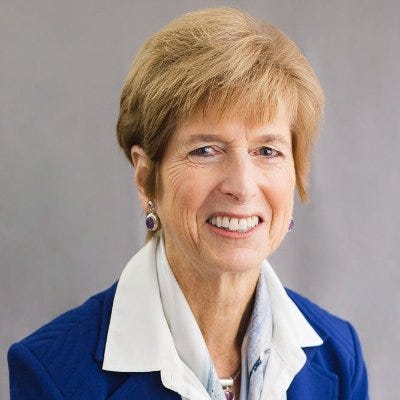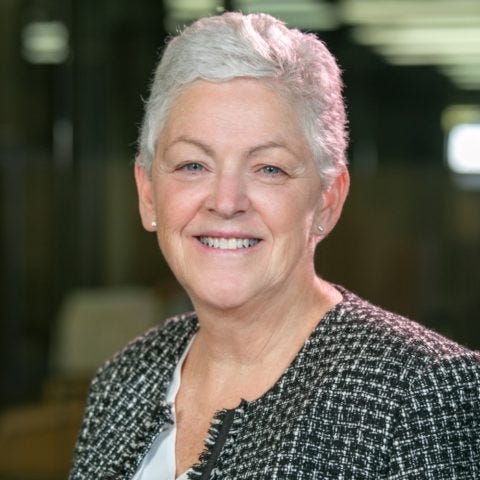
Hamilton’s Common Ground hosted its most recent event called “The Pathway to the Energy Transition” in the chapel on Wednesday, Nov. 6. The guest panelists were two former U.S. Environmental Protection Agency (EPA) administrators: Christine Todd Whitman and Gina McCarthy.
Whitman is the President of The Whitman Strategy Group (WSG), a consulting firm that specializes in energy and environmental issues, and served in the cabinet of President George W. Bush as administrator of the EPA from 2001 to 2003. McCarthy was the first-ever White House National Climate Advisor and served in the cabinet of President Obama as administrator of the EPA from 2013 to 2017. Their conversation on the complex pathways towards renewable energy was moderated by Aaron Strong, Associate Director and Assistant Professor of Environmental Studies at Hamilton.
The panelists discussed the Inflation Reduction Act (IRA) in great length, emphasizing it as an integral part of the energy transition. According to McCarthy, “the Inflation Reduction Act was the epitome of how we turn this corner” and get people engaged. She explained that the IRA was “a $370 billion investment in people, projects and opportunities” that will “change hearts and minds.” Whitman agreed with McCarthy, calling the IRA “the jumpstart that we need for people to understand we can do this.”
Strong challenged the panelists with the question of whether the IRA will be enough to move our economy away from fossil fuels. McCarthy replied by saying that “you’ve got to celebrate the successes and then strive for the next thing that we can do.” She acknowledged that addressing climate change fast is extremely difficult as it requires advancing change in all sectors of the economy. Whitman commented on the challenges of getting people to understand the cumulative impact of individual behavior: “We’re not going to change this overnight. Yes, we’re under pressure. We’ve got to start acting…we have to take [climate change] seriously.”

McCarthy made her stance on fossil fuels clear, saying that “we cannot allow continued expansion of fossil fuels.” She recognized that fossil fuel was an effective way to build the country, but believes it is no longer the path forward.
Whitman then added that she would make a controversial statement as well: “I believe in nuclear power. I believe particularly in small modular reactors and the ability for those to be more safely constructed and put in place to learn more.” She argued that since the rest of the world is going back to nuclear energy, the U.S. should at least be investing in the development of it so that domestic products can be sold overseas. She stressed the potential of investment in nuclear energy, as there are different ways of using nuclear energy now that are safer and easier.
Strong transitioned the panelists into a conversation about local climate action, and specifically about the concern in communities about how proposed solar farms, wind farms and large battery farms will change the landscape. Whitman said that conversations with communities that are going to be involved are necessary. She stressed the importance of local community engagement and giving people the opportunity to have their questions answered. “The public has a right to be heard,” she said. “They may not always agree with you in the end, but they can get more comfortable with the decisions.”
At the end of the discussion, the floor was opened to questions from the audience. One Hamilton student asked the panelists for advice on enacting change on a local or regional level when it comes to issues like fossil fuels. Whitman suggested that students go to the next town council meeting and ask about how they are using energy. “Build that momentum for change” she said, “and let people know that you are holding them accountable and that you care.” McCarthy stated that students can make a significant difference in their life at home, in their family and in their own communities. “You can do wonders working at the local community level,” she said.
When asked about whether Hamilton should divest from fossil fuels, McCarthy replied that every institution should have a strategy to divest from fossil fuels and invest in clean energy. Whitman noted that there are already a lot of universities that recognize the detrimental environmental effects of fossil fuels and are making investments to ensure that they are on the pathway to divest from fossil fuels.
Despite the numerous challenges and obstacles involved in climate action, McCarthy expressed optimism for the future: “We have right now the technologies, the practices, the policies and the products that we actually need to succeed and I think people understand the challenge before us.”
The next Common Ground event, “Taming the Chaos in D.C.,” will be held on Monday, Dec. 4 at 7:30 p.m. in the chapel. The discussion will be centered around the state of our government and the speaker of the house removal.
























